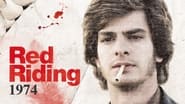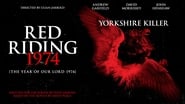NateWatchesCoolMovies
The Red Riding Trilogy is one of the most dense, absolutely impenetrable pieces of work I've ever seen, let alone attempted to dissect with my clunky writing skills. It's also fairly horrifying, as it chronicles the tale of the Yorkshire Ripper, an elusive and mysterious serial child killer who terrorized this area of Britain through the late 70's and early 80's. Viler still are the strong implications that very powerful people, including the brass of the West Yorkshire police, made every disgusting attempt to cover up the crimes and protect the killer, who's murders included that of children. It's a brave move by UK's Channel 4 to openly make such notions obvious within their story, and commendable the level of patience, skill and strong ambition in the undertaking is quite the payoff, whilst simultaneously taking a toll on you for sitting through it. The sheer scope of it must be noted; it's separated into three feature length films, each vastly different in setting, character and tone, and each blessed with a different director. The filmmakers even went as far as to film the first, which is set in 1974, in 16mm, the second in 35mm being set in 1980 and the third makes a leap to high definition video and takes place in 1983. Such a progression of time is a dismal reflection of the sticky corruption which clings to societies, decaying them stealthily over years, and the few keen individuals who will not let the truth die as long as there is a glimmer of uncertainty. Now, if you asked me exactly what happens over the course of this trilogy, who is who, what has happened to which characters and who is guilty, I simply wouldn't be able to tell you. It's a deliberately fractured narrative told through the prism of dishonest, corrupt psyches and has no use for chronology either. Characters who you saw die in the first film show up in the subsequent ones, actors replace each other in certain roles, and there's just such a thick atmosphere of confusion and despair that in the 302 minute running time I was not able to make complete sense. I think this is a great tactic to help you realize that the film means to show the futile, cyclical nature of reality, as opposed to a traditionally structured story with a clear cut conclusion. Events spiral into each other with little rhyme or reason, until we feel somewhat lost, knowing full well that terrible events are unfolding in front of our eyes, events that are clouded and just out of our comprehensive grasp in a way that unsettles you and makes you feel as helpless as the few decent people trying to solve the case. One such person is an investigative reporter searching for the truth in the first film, played by Andrew Garfield. He stumbles dangerously close to answers which are promptly yanked away by the sinister forces of the Yorkshire police, brutalized and intimidated into submission. He comes close though, finding a lead in suspiciously sleazy real estate tycoon Sean Bean, who's clearly got ties to whatever is really going on. The level of willful corruption demonstrated by the police is sickening. "To the North, where we do what we want" bellows a chief, toasting dark secrets to a roomful of cop comrades who are no doubt just as involved as him. The kind of blunt, uncaring dedication to evil is the only way to explain such behaviour, because in the end it's their choice and they know what they're doing. Were these officers as vile as the film depicts in the real life incidents? Someone seems to think so. Who's to know? Probably no one ever at this point, a dreadful feeling which perpetuates the themes of hopelessness. The second film follows a nasty Police Chief (David Morrissey) who is bothered by old facts re emerging and seems to have a crisis of conscience. Or does he? The clichéd cinematic logline "no one is what they seem" has never been more pertinent than in these three films. It's gets to a point where you actually are anticipating every single person on screen to have some buried evil that will get upturned. A priest (Peter Mullan is superb) shows up in the second film only to be involved in dark turns of the third. Sean Bean's character and his legacy hover over everything like a black cloud. A mentally challenged young man is held for years under suspicion of being the Ripper. A disturbed abuse survivor (wild eyed Robert Sheehan) seeks retribution. A Scotland Yard Detective (Paddy Considine) nobly reaches for truth. Many other characters have conundrums of roles to play in a titanic cast that includes Cara Seymour, Mark Addy, Sean Harris, James Fox, Eddie Marsan, Shaun Dooley, Joseph Mawle and more. The process in which the story unfolds is almost Fincher - esque in its meticulous assembly, each character and plot turn a cog in a vast machine whose purpouse and ultimate function are indeed hard to grasp. I need to sit down and watch it at least two more times through before the cogs turn in a way that begins to make sense to me, and a measurable story unfolds. It's dark, dark stuff though, presenting humanity at its absolute worst, and in huge quantities too, nightmarish acts that go to huge levels of effort just to produce evil for.. well, it seems just for evil's sake, really. The cast and filmmakers craft wonderful work though, and despite the blackness there is a macabre, almost poetic allure to it, beauty in terror so to speak. It's rough, it's long, it's dense and it thoroughly bucks many a cinematic trend that let's you reside in your perceptive comfort zone, beckoning you forth with extreme narrative challenge, an unflinching gaze into the abyss no promise of catharsis at the end of the tunnel. There's nothing quite like it, I promise you.
Allguns Allguns
This first part of the trilogy does exactly what the first part of any trilogy should do... Build it up to certain point and leave the audience waiting for a couple answers to the next movie... BUT Red Riding is no ordinary trilogy.A (neo)noir crime and conspiracy led by the young and reckless journalist Eddie Dunford, one Andrew Garfield's greatest performances so far, look for his big break in the case of the lost girls of Yorkshire. At first he looks just as any bloodsucking' a**hole journalist, not just look as one but indeed is. But he look for evidence and his character grows in the eyes of the audience. He doesn't become the most likable character of the movie for sure, but at least he is less unlikeable than Sean Harris' character (What a great performance!). Sean Bean is a walking spoiler, 'cause I knew that he would die! He always dies!The cast is a big ensemble of Britain favorites, as the before mentioned Andrew Garfield, Sean Harris and Sean Bean, as also Michelle Dockery, David Morrissey, Robert Sheehan, Eddie Marsan, Daniel Mays, Peter Mullan and Rebecca Hall. With a cast like that I feel like it is impossible to make a bad movie.Visually, the movie is stupendous. Sometimes very dark and is filled with very visual stuff. As torture scenes, a little bit of sex and disposition of corpses. Andrew Garfield and Sean Harris just blow minds when they share the screen. Let's just say that my hand still feels the pain felt by Dunford's hands.As I said, Red Riding isn't an ordinary trilogy. Is very possible to watch the sequel, 1980 or 1983, without watching the previous movie. At least is how I feel... 1974 had its beginning, development and conclusion; 1974 is a whole picture. In noway just a construction to the next movie. and I do believe that the sequels treat 1974 the same way. They are linked but they can be easily three independent movies. That said, it does not mean that the sequels don't tease the audience's curiosity. Next weekend I'll watch 1980 for sure.
CinemaClown
The first chapter of the Red Riding Trilogy, In the Year of Our Lord 1974 blends elements of real-life events with fiction of its own to put on screen a tale about crime & corruption and follows a rookie journalist who finds himself in the middle of all this while investigating the case of a child murderer.Narrated in a non-linear manner to keep the viewers intrigued, this TV film is finely written & nicely directed but the interest soon fizzles out for the story is plagued by its confusing plot & slow pace plus the way its events unfold, it simply fails to create any sort of suspense or raise the tempo despite numerous opportunities.However, there are a few things that do work in its favour, like its hazy photography & warm colour tones which provide its Yorkshire locations a distinct look n feel. The theme of police corruption is effectively carried out, and a commendable performance from Andrew Garfield definitely makes it an experience that's worth sitting through, at least once.



